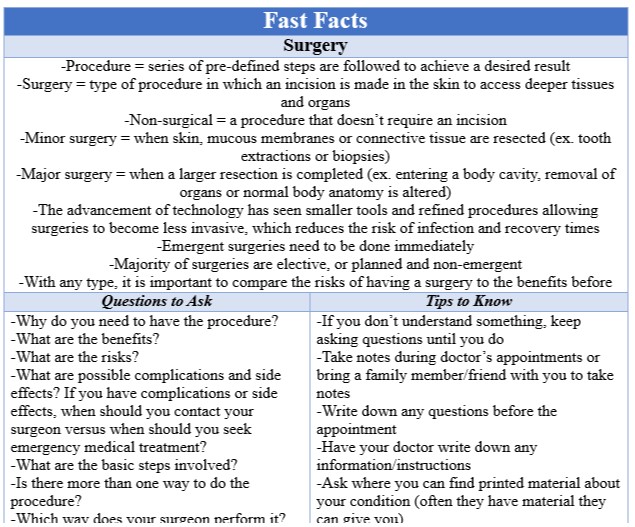What questions should you be asking?
The thought of having surgery can be scary and confusing. It is no wonder because there are so many types and one condition can often be treated by more than one type. So, how do you know which type of surgery is best for you? How do you weigh the risks and benefits? What are the most important things to know before you decide to go ahead with a surgery?
 Definition
Definition
Many people use the words procedure and surgery almost interchangeably, but there is a difference. A procedure is a series of pre-defined steps that are followed to achieve a desired result. A surgery is a type of procedure that involves making an incision in your skin to access deeper tissues and organs. Sometimes procedures that don’t require an incision are referred to as non-surgical. A surgery can be classified as minor or major. A minor surgery is superficial and is when your skin, mucous membranes or connective tissue are cut (resected), such as during tooth extractions or biopsies. A major surgery is when a larger resection is completed, which usually includes entering a body cavity, removal of organs or the normal body anatomy is altered in some way. With the advancement of technology, smaller tools have been created and the process of surgeries have been refined, which means they are becoming less invasive. This is good news because it decreases the risk of infection and reduces recovery time. Emergent surgeries need to be done immediately because it is a life or death situation. Thankfully, the majority of surgeries are elective, or planned, and non-emergent. This doesn’t mean they aren’t medically necessary, such as cataract surgery or knee surgery. However, some surgeries are completely optional, like breast augmentation or liposuction. Whatever type of surgery you are having, it is important to compare the risks of having a surgery to the benefits you hope to achieve prior to having it done and the best way to do this is by asking questions.
Questions to Ask
Prior to having any procedure done, there are several things that you need to ask. The most vital is why do you need to have the procedure? You should find out if it is to relieve pain or other symptoms, fix a medical problem or save your life. The surgeon should be able to tell you the benefits of having the surgery and how long they will typically last. It is key to note that there are no guarantees for success, so don’t expect a promise of a favorable outcome. As the surgeon reviews the information, you should obtain an understanding of the basic steps involved. Sometimes, there is more than one way to do a procedure, so ask it is a good idea to ask if there is, which way does your surgeon perform it and why do they choose that way. It is valuable to know where your surgery will be performed, such as a hospital, outpatient surgery center or in the surgeon’s office. This is helpful in determining a few things, such as will you be to go home the same day or need to be admitted to the hospital? Will you need anesthesia complete the surgery? If you do, your surgeon should schedule an appointment with an anesthesiologist prior to surgery. During this meeting, they will review your health history and medications you take and then discussion your options are as far as type of anesthetic and the risks/benefits of each of these. Once the type is determined, you should find out if you need to stop eating/drinking at a certain time prior to your surgery. It is crucial for you follow this instruction because if you don’t, your surgery could be canceled. Your surgeon should explain to you any risks that are involved in the actual procedure, like complications (ex. infection or bleeding) or side effects (ex. pain/discomfort), and what will be done to prevent or relieve them. During this part of the conversation, they should go over if you experience any problems when you should contact the surgeon versus when to seek emergency medical treatment. While discussing the recovery process, you should find out what you will be able to do, or should not do, at various stages. This can include the use of any special equipment or need of assistance. The surgeon should be able to give you a time frame regarding resuming normal activities, like going back to work or resuming exercise. It is common to have some pain and discomfort after surgery, so your surgeon should explain to you what to expect and what will be done to address it. There are drug and non-drug options. Drugs options include nonprescription medication, such as aspirin, acetaminophen or ibuprofen, for mild pain and prescription medications, like oxycodone and hydrocodone, for more severe pain. As you go through the recovery process, what you will need for pain medicine will change. Non-drug options can include using heat/cold packs, resting, position changes, relaxation techniques and/or nerve blocks (these are similar to when a dentist numbs part of your mouth prior to having a dental procedure done, but for surgeries they are usually performed by the anesthesiologist just before or after). Typically, it is a combination of drug and non-drug options that provide the best relief. It is important to ask if there is anything that you can do to help with the recovery process. In addition to all of this, your surgeon should provide you with alternative treatment options that don’t involve surgery. Often times, these can be as effective, if not more so, than surgery. The benefit of trying these is that they typically come with fewer risks. If you decide to go this route, you and your surgeon should meet again after a set period of time to see if you have had any improvement. If you haven’t, you may decide to proceed with the surgery at that point. Remember, the choice to have surgery is up to you, so prior to deciding, you should find out what will most likely occur if you decided not to have the surgery. It is essential to know if your pain/symptoms will get worse or if it is possible for your condition to improve on its own. Surgery can be expensive, so you should find out how much it will cost and, if you have health insurance, how much of it will be covered versus how much you will be responsible for out-of-pocket.
Tips to Know
When having surgery, there is a lot of information that you need to take in. There are some key things that can help with understanding everything that will increase your comfort level and help you make an informed decision. The most crucial thing you can do is if you don’t understand something, keep asking questions until you do. It can be helpful to take notes during appointments or bring a family member/friend with you to take notes. Write down any questions you have before you go to the appointment, this way you don’t miss anything. You can ask your doctor to write down any information/instructions and ask where you can find printed material about your condition (often they have material they can give you). During the process, be prepared to answer the same questions repeatedly because this is how important information is verified to ensure your safety and wellbeing. One way to be ready for this is by making a list of medications (prescription and over-the-counter), herbs and supplements you take and provide it to your surgeon, the anesthesiologist and anyone else who might need to review it. It is vital to get a second opinion from another surgeon. In fact, many insurance companies require this and will pay for the office visit. Even if they don’t, it is still essential to have one. By doing this, you will be able to make a more informed decision regarding the necessity of having the surgery. It is imperative to bring a copy of your medical records from your first healthcare provider so the second doesn’t repeat the same tests and procedures (most insurance companies will not pay for repeat tests/procedures).
If you do decide to go through with the surgery, it is essential to follow all instructions that are given to you. This can include when to discontinue any medication prior to surgery and when to resume them after, setting up any necessary home care/equipment, any special preparations that you need to follow (ex. tests that need to be completed or eating a special diet) and signing any legal documents, such as informed consent and insurance paperwork. If you use a CPAP machine, know your settings in order to be able to share them to the anesthesiologist. It is important that you stop smoking, don’t drink alcohol or use illicit drugs prior to and after surgery because all of them can affect the surgery itself and your recovery process. On the day of surgery, your surgeon should mark directly on your skin over the site they will be operating on. This helps to reduce the chance of having surgery on the wrong part of your body. During the recovery process, it is essential to keep your pain under control so that you are comfortable enough to be able to move around because increased activity levels have been associated with reduced recovery times.
Having surgery is a big undertaking and it is important for you to have all the information possible so you can make an informed decision prior to proceeding. The best way to do this is to keep asking questions until you are satisfied that you have enough information to make your decision. By doing this, you will know if you truly need to have a surgery and, if you do, what to do to help you recover quickly to get back to your normal life.